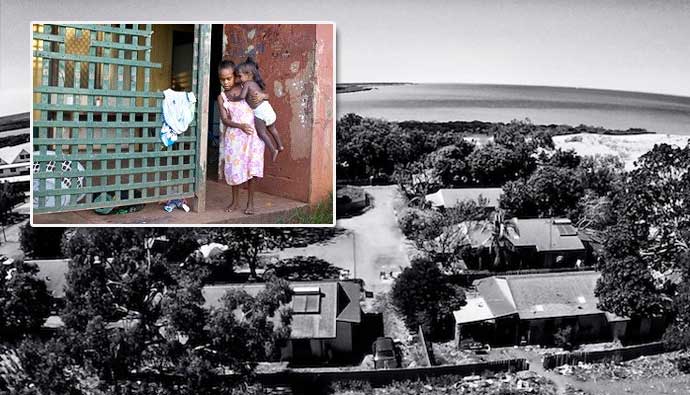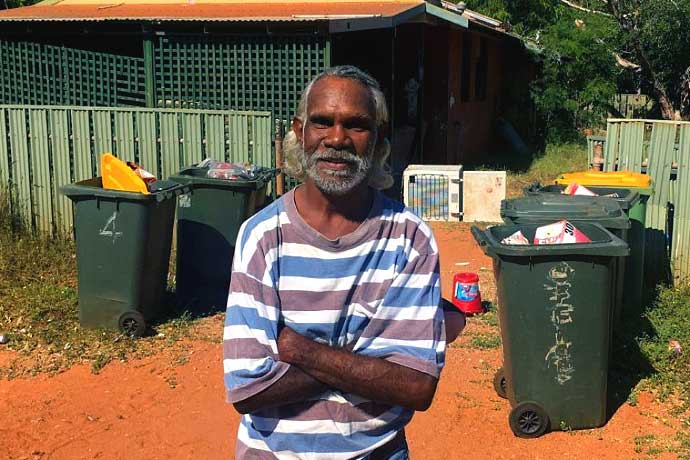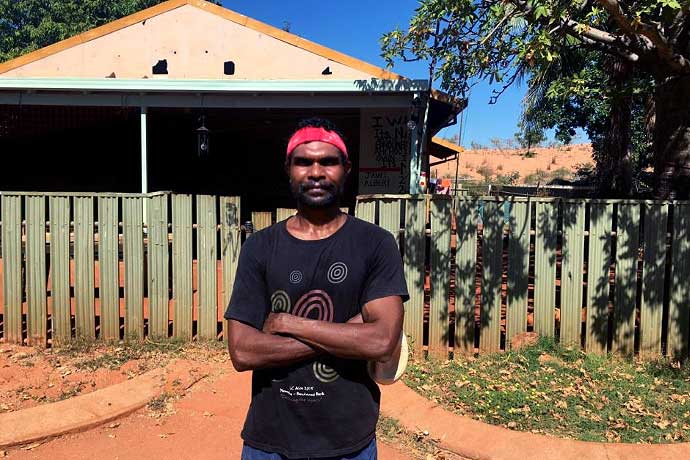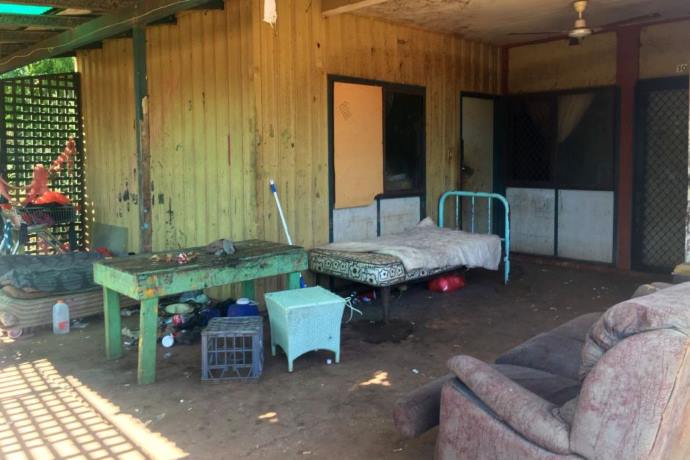Town based Aboriginal reserves are in danger as land prices peak and mining investment slumps
The State Government is currently reviewing the viability of WA's 274 Aboriginal communities, with details of the process due to be released in July.
"We grew up in white tents here, when we were knee high to a grasshopper and then we built tin sheds, and then brick houses, but it will always be home."

Arial photo of Kennedy Hill by Ingetje Tadros, more of her work from Kennedy Hill here, Inset: Children at Kennedy Hill photo by Ingetje Tadro, source: 'The Stringer'
Report by Erin Parke 19 July 2016
The future of WA's 35 town-based Aboriginal reserves is set to come under the spotlight, with some residents determined to stay while others accept an offer of new houses in town.
Town-based reserves are Aboriginal communities that formed around townships around the middle of the 20th century, as Aboriginal families were displaced from their bush homes and moved off cattle stations.
In Western Australia, they are clustered on the outskirts of 20 country towns, with residents often living in sub-standard conditions.
ARCHIVES
The State Government is currently reviewing the viability of WA's 274 Aboriginal communities, with details of the process due to be released in July.
The ABC understands one of the first "priority issues" to be investigated by the remote reform unit will be the future of town-based reserves.
Broome Shire President Ron Johnson said the review was overdue.
"They are yesterday's model, not 2016," he said.
"What created the town reserves was when equal wages came in for places like Noonkanbah and so forth and the people left those stations and came into the towns, and they had to be looked after and reserves sprung up, that's a fact of history.
"It's a Government problem which no one readily addresses, but I'm sorry, it has to be addressed, because you can't have people living in those conditions."
A tale of two towns
The town of Broome, in WA's Kimberley, includes two town reserves.
Nillir Irbanjin, or One Mile, sits on the highway into town and is home to about a dozen families.
The smaller Kennedy Hill community is nestled between sand dunes and luxury apartments, right next to the centre of town.
Several years ago, the Shire of Broome demolished four houses that were so rundown and vandalised they were declared a health hazard.
When the ABC visited this week, several of the remaining houses had broken windows, no electricity, blocked sewerage and were littered with beer cans.

Rodney Wiggan standing outside his house at Kennedy Hill (ABC News: Erin Parke)
Resident Rodney Wiggan said the residents tried to look after their houses but got little support and were constantly fending off drunken out-of-towners, who used Kennedy Hill as a place to drink and sleep rough.
"We got people from everywhere, coming here making humbug and all that, policemen coming here arresting them," Mr Wiggan said.
"We local peoples, we are ok, but it's hard.
"When it going to 10:00am, and the bars open at 11:00am, we get taxis coming up and down then there's a lot of noise here later on, they fight, they stab each other with bottles and the police come up and get involved."
Mr Wiggan said none of the residents of Kennedy Hill had jobs and conceded his family could clean up the house more.
But he said he and his wife, brother and nephew were doing their best in difficult circumstances.
"It is dirty as, you know, and I'm being honest, but we do everything on our own, I've asked for support for each Indigenous department," he said.
"We need support, pest control, to come spray the house and things like that."
Property management in question
The residents would be eligible for that type of support if they signed on with the WA Housing Department to manage the properties.
But they said they had knocked back previous offers from the Housing Authority, because they would have been required to pay rent in order to receive repairs and maintenance.
As a result, the community is left almost entirely to its own devices.
Residents do not pay Shire rates because their homes sit on Aboriginal Lands Trust land, so they are excluded from regular municipal services.
The man responsible for managing the finances and housing at Kennedy Hill is community chairman Billy Ah Choo.
His traditional country is several hundred kilometres north, but he spent time at Kennedy Hill as a child and returned several years ago.

Image: Mallingbarr community Chairman Billy Ah Choo (Pictured) said residents needed more support. (ABC News: Erin Parke)
He said residents were supposed to pay about $50 rent a week to the community's bank account to fund repairs and maintenance but not all do.
"Only two persons, me and my partner, and the old man down there pay rent, nobody else pays rent," he said.
Mr Ah Choo said a recent visit to the Department of Aboriginal Affairs office revealed the community corporation had big debts.
"The bill is so high, the rubbish bill is about $70,000 and the water bill is separate."
He said it had been a difficult time since the two senior men of the community passed away early this year.
But he recently organised a clean-up of the area, and said his church was going to help him improve the living conditions.
"I got a plan for the future, I got people who's going to invest in me and they're the ones going to help me and help this community," he said.
"We're going to build a church right here in the middle of the community and do up the houses, it's going to be good."
Challenges for the future
But Mr Ah Choo and his neighbours will likely come under increased pressure in coming year to vacate the site, and relocate to "mainstream" houses in Broome.
The community corporation holds a 99-year-lease, which gives them the right to stay there for another 60 years.
But the Kennedy Hill site also falls under the Yawuru native title area and sits on prime real estate just metres from the turquoise waters of Roebuck Bay.
There is a widespread belief among Government bureaucrats and Broome locals that the residents would be better off being relocated to new, structurally sound houses in town.
 Image: Rodney Wiggan's House (Erin Parke ABC) - Residents are under pressure to leave these homes and move to the Broome town site.
Image: Rodney Wiggan's House (Erin Parke ABC) - Residents are under pressure to leave these homes and move to the Broome town site."Broome is a fantastic town, but it is chalk and cheese," Shire President Ron Johnson said.
"The apartments across the road are beautiful and well-maintained and then virtually behind them you have this squalid accommodation and it is a blight on Broome.
"You're talking about over-crowding, houses that get little repair.
"You have to move on and make the living conditions for people better, for them to live and work and grow in and develop."
The number of residents appears to have reduced in recent years, with the Housing Authority confirming some residents had accepted the offer of a new house in Broome.
But the remaining residents say they are determined to stay, saying it was their home and their lifestyle, and one they would fight to preserve.
"We are still here and we are going to stay," Mr Wiggan said.
"We are not going to move from this place, because it's our place, and it's where our memories are.
"We grew up in white tents here, when we were knee high to a grasshopper and then we built tin sheds, and then brick houses, but it will always be home."
Previously published by ABC News 9 July 2016

